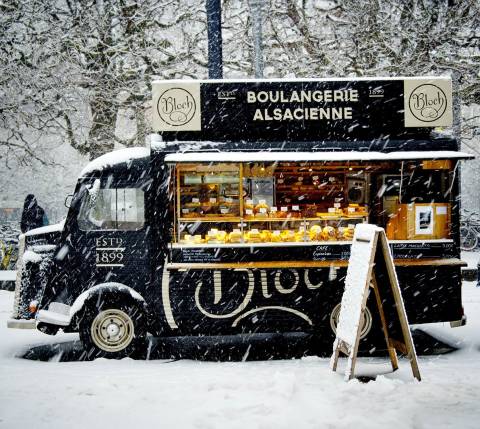There’s a lot to consider when embarking on a food truck business. As any seasoned restaurant operator knows, cooking delicious food and operating a successful business are two different beasts. Running a successful food truck involves navigating the details of logistics and finances, so a thorough business plan is essential. From researching locations to navigating municipal business licenses to planning for inclement weather, a business plan for a food truck needs to cover a lot of bases.
Like any solid roadmap, a good food truck business plan will have all the essential sections laid out to help you identify potential challenges and develop strategies to overcome them. Here’s what you should consider as you begin the initial stages of your food truck venture.
How is a food truck business plan different from a restaurant business plan?
Food trucks differ from traditional brick-and-mortar restaurants in both obvious and more subtle ways. The biggest distinction, of course, is a food truck's mobility, allowing you to move your location, reach more customers, and test out different neighborhoods. For example, the clientele during lunch hour in your local financial district will look much different than late-night entertainment district patrons — but a food truck can target both.
Another difference is that food trucks often incur lower overhead costs compared to restaurants, which should be reflected in financial planning. The amount of capital needed for a food truck depends on factors such as renting or buying the food truck, accessing and renewing required permits and licenses, ongoing seasonal vehicle maintenance, staff expenses, and more. In a food truck, you’re operating from a significantly smaller space than a commercial kitchen, so you’ll be looking at specific costs for equipment, employee management, order fulfillment, and other operations.
Food truck business plan overview
Your food truck business plan should include the essential elements of a traditional restaurant business plan, but with added considerations for mobile operations and flexibility. Here are the important steps for creating your food truck business plan.
1. Create an executive summary
Introduce your food truck business by highlighting your specialties, target market, and what sets your food truck apart from other brick-and-mortar restaurants and food trucks. This is your opportunity to lay out your vision in full.
2. Conduct market analysis
Commission a market analysis to research the size of your target market, customer demographics, the competition, and how you aim to fulfill the niche of the customers' tastes in the area you hope to operate in.
3. Detail an operational plan
This section should explain, with as much detail as possible, how you plan to operate your food truck business day-to-day, including information about staffing, the food truck itself, suppliers, equipment, and more.
4. Develop a financial plan
Develop a comprehensive financial plan that includes a profit and loss statement, cash flow statement, and balance sheet. Also, forecast the necessary expenses for your food truck, such as COGS, labor, licenses, permits, and insurance.
5. Craft a marketing plan
A marketing strategy clearly defines your target market and outlines the various channels you will use to reach your audience. This will include leveraging social media marketing, as well as traditional or online advertising, participating in community events, establishing partnerships with other businesses, and more.

"You have to have diversified revenue streams if you're going to make it in this industry. We just try to think of any way we can to bring in revenue to the business. Even things you wouldn't ordinarily do, you have to just try."
How do seasons affect the food truck industry?
Seasonality significantly influences food truck businesses, with the winter months often posing distinctive challenges. While food truck operators usually extend their hours during the summer months to capitalize on the longer days, the colder weather and shorter days can result in fewer outdoor events and walk-up customers, impacting overall sales and revenues.
As winter approaches, you’ll want to start adapting operationally, which could mean exploring opportunities to cater private indoor events, offering delivery, partnering with local businesses for pop-ups, and keeping an eye out for holiday market-type venues and events.

The rigors of winter weather will also affect a food truck’s operations and maintenance. Cold temperatures can cause the truck's water lines to freeze, and icy or salty roads can lead to increased wear and tear. It’s essential to invest in the proper winterization of the truck for preventative maintenance, such as insulating water pipes and equipping the vehicle with winter-appropriate tires and heating systems. By understanding these differences and preparing accordingly, food truck operators can mitigate the challenges posed by winter.
Get a free food truck business plan template
Creating a food truck business plan is no small feat. It requires attention to detail, focus, and a lot of research. Keep in mind the different components of the plan discussed above, and remember that your food truck business plan should reflect your vision for what you want your business to become.
A well-crafted food truck business plan is critical in securing funding, attracting partners, and establishing a clear direction for your food truck business. If you’re thinking about starting a food truck, we’ve created a free food truck business plan template for you to use and customize.





